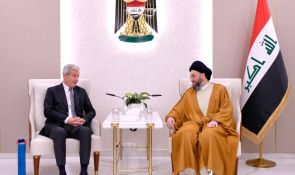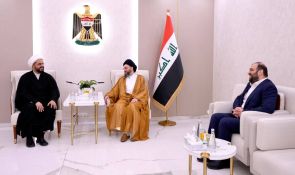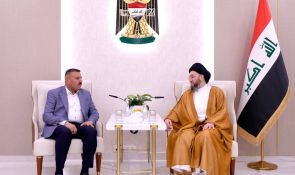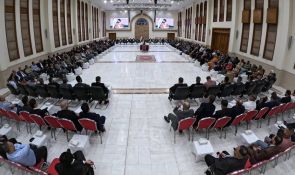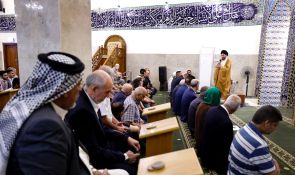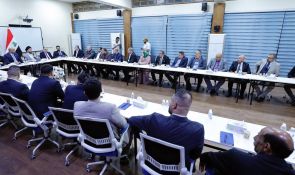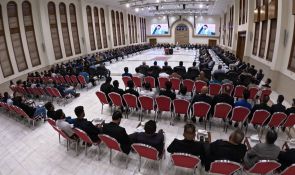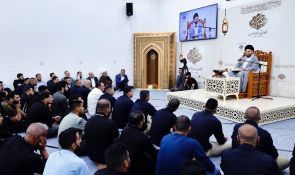His Eminence received the head of the Islamic Iranian Consultative Council and leaderships of the National Alliance. Larijani lauds stances of Sayyid Ammar al-Hakim on the Iraqi field and role in uniting the political situations
Sayyid Ammar al-Hakim, Head of the Islamic Supreme Council of Iraq (ISCI), received at his Baghdad office the head of the Islamic Iranian Consultative Council, Dr. Ali Larijani, and his accompanying delegation on Wednesday, November 28, 2012 in the presence of leaderships of the National Alliance, including Vice President Dr. Khdhayyir al-Khuza`i and the general secretary of the Badr Organization, Hadi al-Amiri, as well as Baha al-Araji, a member of parliament from the Sadrist Movement, Shaikh Khalid al-Atiyya, Dr. Ibrahim Bahrul-Uloom, formerly oil minister, Dr. Ahmed al-Chalabi, Sayyid Hussain al-Sadr, member of parliament Khalid al-Assadi, Mr. Hashim al-Hashimi, general secretary of the Fadhila Party, and MP Ammar Tu`mah, head of the Fadhila bloc in the parliament. The meeting was also attended by leaderships from the Movement of the Martyr of the Niche, Shaikh Jalalud-Din al-Sagheer, Mr. Baqir Jabr al-Zubaidi, head of the Citizen Bloc in the parliament, Shaikh Muhammed Taqi al-Mawla and a number of members of the parliament and Iraqi political personalities.
Larijani lauded the stances of Sayyid Ammar al-Hakim in the domestic and regional crises and his gathering the leaders of the Alliance to welcome him, expressing his appreciation of al-Hakim’s role in on the Iraqi field and the liberalities of this family as well as the impact of these liberalities on Iraq’s modern history, explaining that Sayyid Ammar al-Hakim complements the march of imam al-Hakim (may he be sanctified), the Martyr of the Niche, Grand Ayatollah Sayyid Muhammed Baqir al-Hakim (may he be sanctified), the Martyr of the Niche, Grand Ayatollah Sayyid Muhammed Baqir al-Hakim (may he be sanctified) and Sayyid Abdul-Aziz al-Hakim (may he be sanctified) that have given Iraq so much.
Sayyid Ammar al-Hakim explained that al-Hussain (Ú) taught us how to turn the challenges into opportunities to serve the progress process, emphasizing that Iraq is capable of participating in solving the regional problems through presiding over the Arab Summit, explaining that Iraq’s regional role needs the domestic cohesion, and this is what is emphasized by the National Alliance in its capacity as the largest bloc. He pointed out to the general path being one for unity, proximity and alliance, explaining that the entitlements of the forthcoming elections require more unity and solidarity and stressing that calming down the Iraqi political field is very important in the shade of the serious regional transformations, expressing his optimism about overcoming all the challenges due to the domestic harmony.
His Eminence explained that the situation in Syria is a cause for concern, stressing that the peaceful solutions in Syria lie in restoring stability to Syria and the region without foreign interferences.
Larijani, in turn, stressed that the developments in the region require an Iraq that is secure and stable, emphasizing that his evaluation of the regional conditions following the changes that have taken place is positive, retracting that this evaluation does not deny the existence of negativities but the tilting of the scales of positivities over negativities, explaining that the political forces in the region nowadays express the will of the peoples, and they now enjoy capabilities which they did not enjoy before as is the case in Palestine, Lebanon and Iraq. He provided the evidence of the sons of Gaza and Lebanon, the small groups that have a great will which encountered the Israeli enemy, pointing out to the struggling forces in the region having obliterated the notion of international dictatorship, stressing the conviction of the Islamic Republic of Iran that the solution for the Syrian crisis lies in the nation solving it while maintaining the attribute of resistance in Syria in parallel with the democratic reforms in that country.


